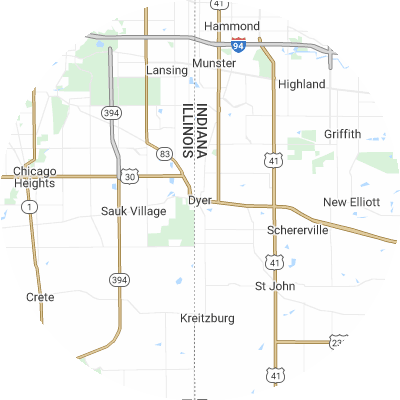Please enter a valid 5-digit zip code!
Written By David Cusick
Last Updated April 2024
Rooftop solar energy is becoming increasingly popular for Dyer homeowners. A solar panel array can help you decrease your carbon footprint, add value to your property, and provide a dependable source of power. Transitioning to solar energy can reduce your monthly energy expenses and decrease your carbon output. Before you begin the process, you want to make sure you find a reputable installer. Luckily, we've done the research and assembled a guide to the best and most reputable solar installation providers in Dyer.
Reliable customer support
Informative resources
Free quotes
Clear pricing policy
Services Offered
Prompt service delivery
Reliable customer support
Free quotes
Clear pricing policy
Services Offered
Informative resources
Clear pricing policy
Reliable customer support
Services Offered
Free quotes
Clear pricing policy
Reliable customer support
Informative resources
Services Offered
Informative resources
Reliable customer support
Free quotes
Clear pricing policy
Services Offered
Clear pricing policy
Free quotes
Informative resources
Reliable customer support
Services Offered
Clear pricing policy
Informative resources
Free quotes
Reliable customer support
Services Offered
Clear pricing policy
Prompt service delivery
Reliable customer support
Informative resources
Services Offered
Free quotes
Reliable customer support
Informative resources
Clear pricing policy
Services Offered
Informative resources
Free quotes
Clear pricing policy
Reliable customer support
Services Offered
Today's Homeowner looks at dozens of datapoints on solar companies to come up with our data-driven rankings. It's not possible for a company to pay for preferential treatment in our rankings. We look at the following key factors in determining who should top our list:
Putting solar panels on your roof could cut your electricity payments while benefiting the planet by reducing your carbon footprint through renewable energy use. Key considerations when looking at local solar installers are as follows.
It's imperative that your solar installer has the proper licensing. This ensures that the work is done correctly using current installation best practices. In Indiana, there are no electrical or solar contracting licenses at the state level, but localities might adopt their own licensing programs.
Check review sites like Google Reviews, TrustPilot, and the Better Business Bureau (BBB) to see feedback from past customers about local solar companies. Detailed reviews can help you assess a company's dependability and level of service. Use caution with providers that have hardly any reviews or mostly negative ones.
Contact 3–5 solar companies for free, detailed quotes. Quotes should clearly outline all costs and list the exact solar components included. By comparing multiple quotes, you can identify the best value based on your budget.
Quality solar installations should come with comprehensive workmanship and performance guarantees. The workmanship warranty covers any installation issues such as cracks in the panels, poor alignment, or poor wiring. The performance warranty ensures a specific energy output level. Strong guarantees indicate that a solar installer trusts its installations.
Switching to solar power can help decrease your energy expenses over time. Be sure to consider these aspects when judging the cost and value of solar panels.
The cost of home solar panels in Dyer varies depending on several factors, including your system's expected capacity and the type of panels you'll use. Generally speaking, a typical solar energy system costs $4,100 per kilowatt, not including labor, permit fees, or preliminary work. Most solar systems in Dyer are 8.9 kilowatts, and the typical Dyer homeowners spends $25,659 after accounting for federal tax refunds. Some homeowners may prefer to lease solar panels and reduce upfront costs.
Incentive Amount:
Solar energy systems used for heating or cooling: out-of-pocket expenditures by the owner for the components and labor
Wind, hydroelectric, geothermal, solar thermal, solar PV, and other solar energy systems: the assessed value of the system
Generally speaking, a solar photovoltaic (PV) array can be used to power any household appliance or system that uses electricity. In the simplest case, you can use a solar water heating system.
With home solar energy, you can recoup the cost of the system over time, lower your home's carbon footprint, and gain additional energy independence.
It depends on where you live and the kind of panels you plan to use. Since there's a moderate amount of snowfall in Dyer, your best time to get solar is in the spring and fall.
Your installer can give you an estimate of what your energy bills will look like after you install solar panels. Generally, your energy bills will decrease significantly because you'll be using energy from the sun for free, instead of buying energy from the utility company. The average annual savings in Dyer amount to $1,913.
Your payback period is the time to achieve an ROI on your solar panels. It will vary based on their rated capacity, the average sunlight in your area, and the rate your utility charges per kilowatt of power. Dyer gets quite a bit of sunlight per day, so an average payback period could last up to 13.4 years per 5 kW of capacity.
Net metering is a power purchasing policy that allows solar energy system owners to receive bill credits or payments for the amount of energy they put back into the grid. It's available in most states and is a great way to reduce energy costs.
While solar energy might not be ideal for some in dark or wet areas, the latest generation of equipment and energy storage systems could increase your property's solar viability enough where you could achieve a return on investment. A contractor could also recommend a different primary source of renewable energy like wind or geothermal to boost your generation.
Solar panels are on par with other forms of renewable energy. They have inexpensive upkeep and today's systems can stand up to the worst conditions.
